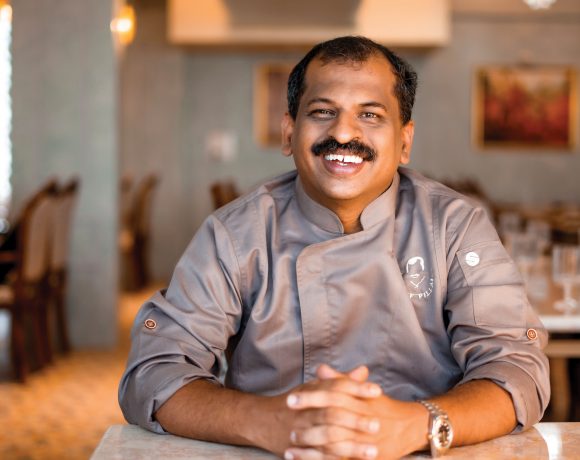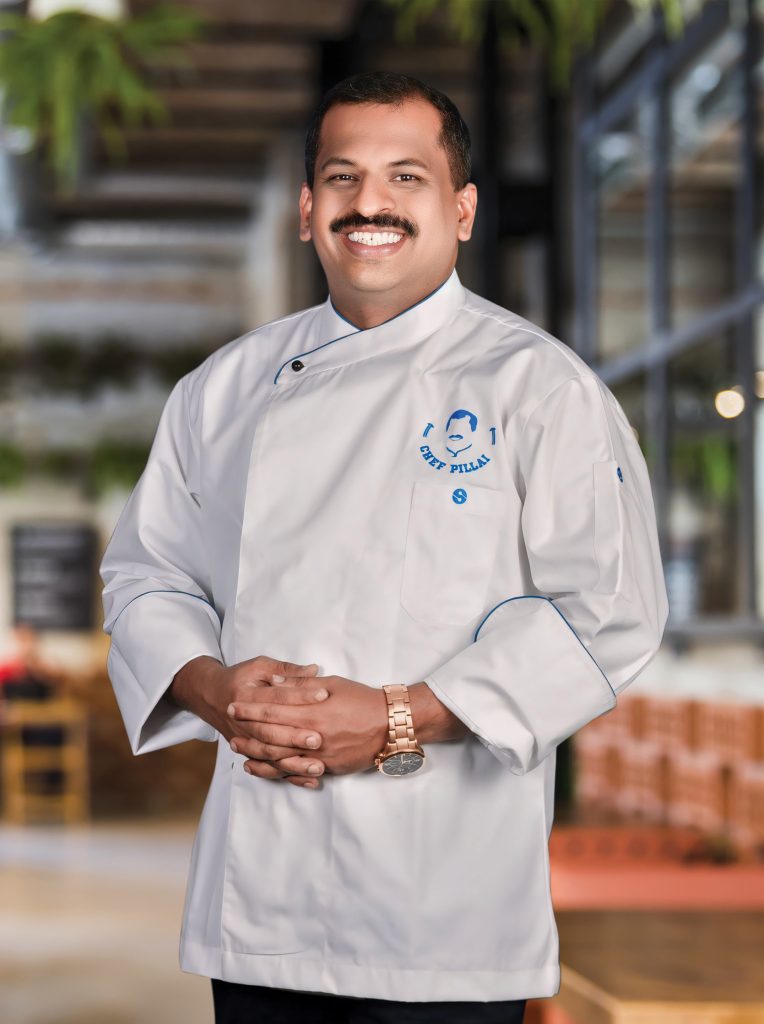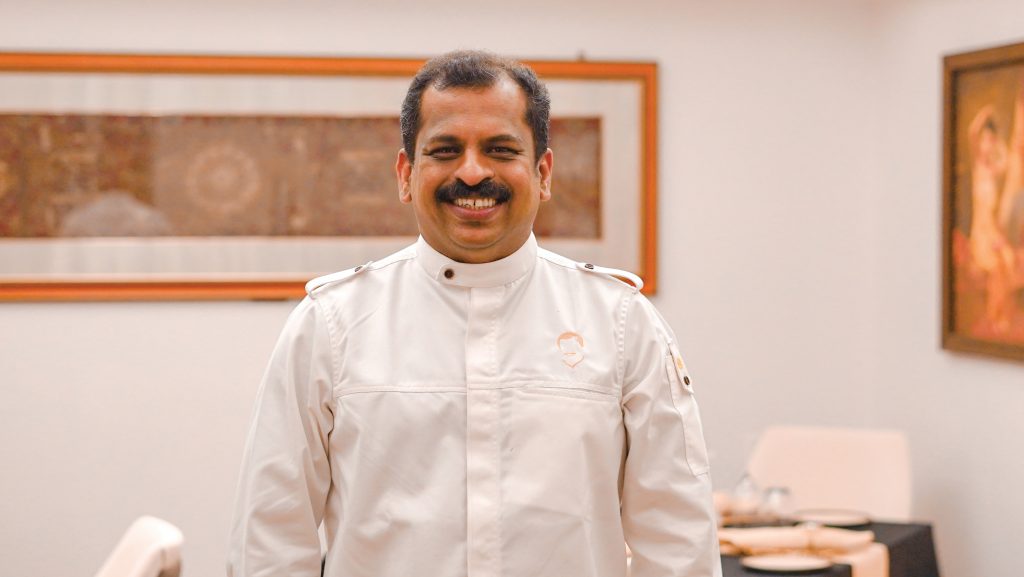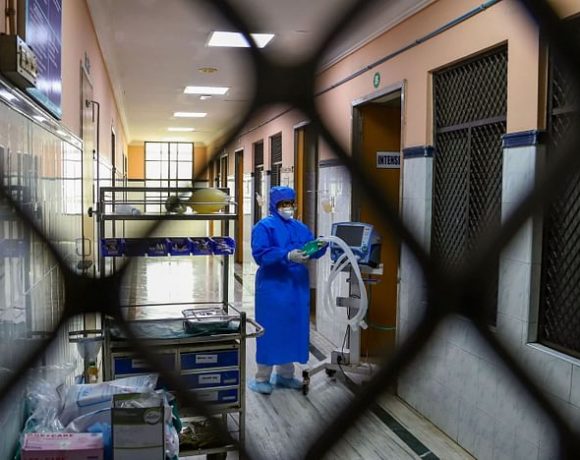
Brands dominate our lives in this social media era, yet the captivating stories behind their rise often remain untold. One such story is that of Chef Pillai, whose journey to fame is truly remarkable. Much like the legendary alchemists who transformed base metals into gold, Chef Suresh Pillai has achieved a golden touch in the culinary world through his passion, skill, and relentless pursuit of excellence over more than three decades. From the shores of Ashtamudi Lake in Kollam, his path has led him to kitchens around the globe, making him a culinary wizard committed to both innovation and tradition. Join us as we unveil the secrets behind Chef Pillai’s culinary mastery, the creation of his brand, and his transformation into a successful entrepreneur.

Tell us about that remarkable journey of transformation that began on the shores of the Ashtamudi Lake?
My journey from Suresh to Chef Pillai began in a quaint village in the backwaters of Kollam district. Born into an ordinary family, I stumbled into the culinary world by chance after completing Class X. Circumstances at the time prevented me from pursuing formal education in the field. However, as I immersed myself in the kitchen, I discovered a natural talent for cooking and became fascinated by its endless possibilities.
My fortunes took a positive turn in 2005 when I traveled to the UK for work, armed with 15 years of experience and a strong work ethic. Initially, I went by my name, Suresh Pillai, but due to the importance of surnames for work permits, I soon became known as Mr. Pillai. At Veeraswamy, England’s first Indian restaurant established in 1927, I was the sole representative of Kerala cuisine among chefs and staff from North India, earning the moniker “Chef Pillai.”
Venturing into social media, I faced difficulties creating an account as “Suresh Pillai,” leading me to adopt the persona of Chef Pillai. Despite never envisioning a return to India while enjoying life abroad, my fame grew through social media and appearances on BBC’s Masterchef, paving the way for recognition as Chef Pillai in my homeland.
In 2017, an opportunity to work in Kerala at The Raviz Hotel in Kollam prompted a return. Initially, the plan was to go back to England after the contract ended, considering our citizenship status and children’s happiness. However, fate had other plans, leading to the decision to establish my own venture in Bangalore post-COVID. Within six months, another restaurant opened in Kochi’s Le Meridien, owned by the Marriott Group—yet another milestone. Within a year, four more enterprises were started, including one in Qatar.
Transitioning from chef to entrepreneur proved challenging, requiring attention to various aspects beyond culinary skills, such as marketing and finance. Despite the hurdles, my vision of promoting Kerala’s flavours worldwide fueled the expansion of my restaurant empire. With the support of investors and a dedicated team, I am on the verge of completing 60 restaurants this year, following three years of development. Each establishment will offer a diverse array of tastes and price ranges.
The journey from Suresh to Chef Pillai symbolizes not just personal growth, but also a commitment to sharing the essence of Kerala cuisine on a global scale. And the journey still continues.
What circumstance led to your journey to Britain?
I had always dreamed of venturing to Europe, America, or Australia, despite receiving numerous job offers in the Middle East. I held out for the chance to fulfill my European aspirations, and that opportunity finally came in 2005. While working at Kumarakom, I received a call summoning me to Mumbai for an interview for a job in the UK. After five days of interviews, I was selected, and within a week, I found myself in London.
Securing a position at Veeraswamy, England’s first Indian restaurant, was a significant milestone. Amidst a vast array of chefs, I was chosen as the sole representative of Kerala cuisine—a role that exposed me to new experiences and learning on an international scale. Reflecting on my career, those 15 years spent in the UK remain some of the most valuable and formative.
What aspect of your culinary journey has brought you the greatest joy and fulfillment?
Establishing eleven new brands, launching sixty successful restaurants, and fostering a sense of community among over a thousand individuals in just three years has been the most rewarding aspect of my career. Throughout my professional life, I have received numerous awards and recognitions for my culinary expertise and letters of commendation from various distinguished personalities.
However, the greatest joy and satisfaction over the past thirty years have come not just from the work itself, but from the opportunity to contribute significantly to the livelihoods of many families. This has been the most fulfilling part of my journey, bringing me immense happiness and contentment.
What are the secret ingredients to becoming an exceptional chef?
To become an excellent chef, one must have a passion for the culinary art. The willingness to continually learn new things and the humility to acknowledge that there is always more to learn are essential. It’s not enough to just study; practical experience is crucial for gaining a deeper understanding. Trying to correct mistakes and improve based on our knowledge gaps is necessary. If we accept and acknowledge our inadequacies, we can strive to achieve excellence. Otherwise, if we assume that our learning is complete, success will always elude us. Success comes from adapting and incorporating lessons from our experiences, both good and bad, into our practices.
Could you define the learning and training phase that moulded Chef Pillai?
In my experience, pursuing a formal course over several years can certainly be beneficial. However, I’ve also come to recognise that proficiency can be achieved through dedication and effort alone. Despite not having studied Hotel Management, I’ve ascended to senior positions in prominent hotels and restaurants, albeit with numerous challenges along the way. This isn’t to discount the value of education; rather, it emphasises the importance of how one applies their knowledge and skills. I’ve encountered individuals who, despite obtaining degrees and undergoing training, failed to excel. What truly matters is the mindset we cultivate between learning and practice, remaining open to the lessons that surround us. Whether it is skills acquired from humble beginnings or insights gained from observing others, embracing continuous learning and adaptation is key, particularly in an ever-evolving industry.
In your global palate-hopping journey, what is your favourite dish?
During my three decades as a chef, I’ve had the privilege of sampling a vast array of dishes from around the world, ranging from the most refined to the simplest fare. Each culinary creation originates from the culture of the country, shaped by its landscape, climate, and the customs of its people, evolving over the years. If one can appreciate the history behind it and savour it with understanding, everything will taste not only delicious but also fascinating. Personally, I hold a deep appreciation for the diverse flavours of Kerala cuisine, but I also have a penchant for Japanese food due to its health benefits and nuanced flavours.
Are you planning any specific initiatives to support economically and educationally backward individuals aspiring to enter the culinary sector?
Undoubtedly, with the widespread presence of Malayalis globally, there has been a remarkable surge in the popularity of Kerala cuisine among enthusiasts worldwide. This trend presents a significant opportunity for Malayalis, whose upbringing and intimate knowledge of Kerala’s culinary traditions uniquely position them for success in the field. Acknowledging this potential, I am committed to establishing a skill center or academy that offers comprehensive, hands-on training alongside theoretical study. The aim is to equip individuals of all ages with the essential skills needed to thrive in the culinary industry.
This initiative seeks to provide accessible education and employment opportunities, transcending traditional four-year courses and catering to the diverse needs of aspiring chefs. With the imminent launch of numerous restaurants and my vision to establish a hundred establishments, these initiatives are geared towards empowering individuals to pursue fulfilling careers in the culinary arts, irrespective of their background, age, or circumstances.

What does ‘skill training’ entail?
Let me illustrate with an example. ‘Appam’, a cherished delicacy among Malayalis, holds a special place in many hearts. Crafting a delicious and well-made appam involves a meticulous process: grinding rice flour, preparing a batter, fermenting it for several hours, and skillfully cooking it to perfection.
While many may be familiar with the basics of preparing appam, the true skill lies in maintaining consistency and quality with every batch. A skilled chef can expertly manage the fermentation process, ensuring that each appam maintains the desired level of sourness, even as the quantity of batter varies. This level of precision, coupled with the ability to cook without over or undercooking, requires not just practice, but honed skill.
Mastering this art can lead to a respectable income, potentially around Rs 35,000 per month. It’s a testament to the value of culinary expertise and the rewards that come with dedication and skill in the kitchen.
How does cooking time differ across countries? Could you share your experiences working with renowned chefs worldwide?
Upon arriving in the UK, I had to reevaluate certain culinary practices, particularly the notion of precise cooking times. While in Kerala, flexibility with cooking durations, such as in prawn curry, may be acceptable, international kitchens demand precision. Even a slight deviation in timing or spice levels can significantly affect a dish’s quality. Unlike Kerala, where taste reigns supreme, international kitchens prioritize consistency and strict adherence to predefined standards. My experiences collaborating with top chefs globally have emphasized the critical role of precision and consistency in attaining culinary excellence.
All of Chef Pillai’s restaurants uphold international standards. How can ordinary folks enjoy Chef Pillai’s flavours?
Indeed, this question has been asked by many, and my aspiration has always been to make my culinary creations accessible to everyone. One strategy has been to establish a premium brand, Chef Pillai, which has facilitated partnerships with esteemed establishments like Marriott. While the premium brand has opened doors to new opportunities, my ultimate goal is to offer high-quality cuisine at affordable prices. In upcoming projects, I aim to introduce dining options that cater to a budget-friendly range, with the ultimate vision of creating restaurants where meals are priced at Rs. 100. This endeavor is currently in progress, with a focus on maintaining the high standards set by our existing ventures.
Can we anticipate the establishment of a Chef Pillai Institute in the future?
Absolutely. Efforts are underway to bring this vision to life as soon as possible. Establishing an academy dedicated to culinary arts will provide aspiring chefs with the training and skills they need to excel in the field. My goal is to preserve traditional recipes and culinary heritage while imparting knowledge to future generations. Creating the Chef Pillai Institute is a tangible step toward achieving this goal, ensuring that our culinary legacy endures for years to come.
Picture Courtesy: Pegasus Photography/images are subject to copyright

